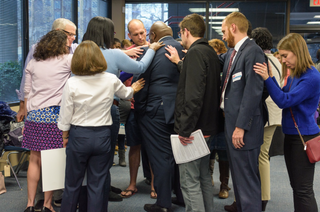Health
10 Reasons We Keep Going to Parties During a Pandemic
The biased and non-biased reality of taking health risks.
Posted December 21, 2021 Reviewed by Lybi Ma
Key points
- Many people at a recent wedding in Milwaukee contracted COVID-19 and brought it back with them to California.
- Groupthink, misinformation, and habituation are some of the potential reasons people appear to be ignoring warnings about large events.
- Here are several potential strategies to counter the social forces behind taking COVID-related risks.

In one of the latest examples of a COVID-19 outbreak, over a dozen individuals who attended a Milwaukee wedding have tested positive (including some with the Omicron variant). Many of these individuals were employees at a medical center in Oakland, California, and they have now exposed at least 38 hospital workers and patients back in their home state (Bentley, 2021; Reyes, 2021). The many stories like this one raise a fair question: Why do we keep attending large mask-free gatherings?
As always with a crisis, the more we know about the potential causes, the better chance we have to contain the crisis or just make good personal decisions. I will discuss several possible reasons why many people still attend large and potential superspreader events despite the warnings and negative consequences. This list is not exhaustive and not necessarily in order of importance or power.
Some of these reasons represent bias or misperception. But there are other potential reasons. I don’t presume to know the mind of any particular attendee at these events, and I don’t mean to demonize those who attend. And of course, some large gatherings are riskier than others. One of the infected attendees at the Milwaukee wedding, who then infected her daughter, seemed to say that she wouldn’t have attended except that she knew most of the attendees were vaccinated (Reyes, 2021).
1. Social Pressure
Sometimes you might want to say no to attending, but friends or family members apply pressure. When you’re pressured by those you care about, it may be difficult to say no. They might say or imply that “it’s a family tradition” and people “will be disappointed if you don’t make it.” Families are not usually shy about using guilt. And their motives may be pure. They love you and don’t want you to be alone for the holidays.
2. Groupthink

One aspect of social pressure, and especially groupthink: When you start to go against the pressure or to question the group, the group may punish you in some way (Myers, 2013). It can be about group cohesion or loyalty. It could start with a guilt trip, but members of the group or family can also criticize or make fun of you. In extreme cases, including in political contexts, group members or the group leader can ostracize you (or run a candidate against you in a primary). I don’t think family members are the same as political operatives, but it’s also fair to say that our political affiliations can influence our COVID risk-taking behaviors (Gollwitzer et al., 2020).
Some of your relatives or fellow group members may be cautious about COVID-19 like you are, but you may not hear from them because they’ve been quieted by the guilt-trippers, their political party, or a fear of punishment. This dynamic is part of groupthink’s self-censorship and illusion of unanimity. Some have even gotten vaccinated in secret “for fear of backlash from their friends and family who oppose vaccination” (Elamroussi, 2021).
3. Pluralistic Ignorance
Part of groupthink and illusion of unanimity is the false impressions we might form of each other. When you look around and don’t see others saying no to the gathering, you may get the impression that these others want to attend. And this impression may pressure you not to say no. The problem is that they’re looking at you too. They see that you’re not saying no, and they get the impression that you want to attend. This collective false impression about motives is called pluralistic ignorance (Prentice and Miller, 1993).
At an event or grocery store, you might see no one wearing a mask and assume they’re not in favor of masks, which pressures you not to wear one. The problem is that the sight of you not wearing a mask can cause them to think you’re against masks as well.
This dynamic has been documented in multiple contexts. Most college students assume their classmates are more comfortable with drinking than they actually are (Prentice and Miller, 1993). Most people think others are more comfortable with the idea of divorce than they actually are (Stalder, 2012). In the bystander effect, bystanders mistakenly interpret each other’s lack of action as there not being an emergency that requires action (Myers, 2013).
4. Positive Illusions
In general, people tend to be overly optimistic about themselves. At a group level in groupthink, this is part of illusion of invulnerability. We may believe that we just won’t get sick, that our family or group knows what it’s doing, or that we’ll wear a mask the whole time and not feel pressure to remove it. People also typically overestimate how much control they have over negative life events. Such unrealistic optimism and illusion of control are referred to as “positive illusions” and are mentally healthy to some degree (Taylor, 1989; Taylor et al., 2000).
5. Misinformation
Unfortunately, there’s a lot of false information out there about COVID-19 which can distort our perceptions of the real risks and contribute to COVID-risky behavior. Part of this issue is trusting those who share misinformation and distrusting the health officials who tell us to discount it.
6. “COVID Fatigue”
It’s hard to stay away from the people we care about or from the large events we’ve always attended. It’s been almost two years since the pandemic started. It’s certainly understandable if some of us say enough is enough and want to return to some aspects of our normal social life. Acting on that sentiment is the tougher issue.
7. Love of Family and Traditions
Combined with COVID fatigue, our desire to be with loved ones and to return to family or cultural traditions can obviously be very strong. It is understandably undesired to have only a few masked family members or friends at your wedding.
8. Habituation
Many of the attendees at a superspreader event may have previously gone to other gatherings without getting infected. This track record might contribute to some of the other reasons, such as unrealistic optimism and illusion of control. Indeed, any anxiety you might’ve experienced at that first gathering may decrease with each successive gathering that doesn’t result in a positive test result. This decrease can be called habituation.
Despite the absence of logic in generalizing from a small sample of personal experiences (in which infection can occur without symptoms), cognitive-behavioral therapists who practice exposure and response prevention (ERP) rely on this general decline in anxiety (although it’s not a guaranteed outcome of ERP). A decline in anxiety is generally good, and habituation has psychologically helped people in their return to in-person work. But while repeat attendees at large events become more comfortable about the risks they’re taking, each additional event statistically adds to the number of infections, hospitalizations, and deaths. A little less habituation might be helpful for society right now.
9. Logical Risk Assessment
Although justifying attendance at a superspreader event might automatically slide into rationalization (another symptom of groupthink), I want to acknowledge that an individual may be able to make a logical (i.e., non-biased) decision to engage in a COVID-risky behavior, even when that behavior can lead to the infection of immunocompromised others who avoided that behavior themselves. Some of us might argue there is no justification for superspreader events. But aside from the event itself, different individuals have different risks of infection, different strains on their mental health or group relations affected by their decision, and different levels of interaction with immunocompromised others.
My point is not the growing maxim that we each have to decide for ourselves how much risk we’re willing to tolerate. When innocent others can be harmed, this maxim seems to fall short. Rather, I’m saying that depending on your goals, deciding to put yourself and others at some risk is not in itself automatically biased. But if the main goal or premise is to save the most lives, then we cannot attend these events.
10. Personal Traits
In addition to political affiliations, there are many other personal traits or characteristics that can affect decisions to congregate during a pandemic. Some of us may be bigger risk-takers, more social, more family-oriented, or less health-conscious.
Remedies
There are potential remedies to counter the social forces that increase risk. For example, if you’re organizing the event, try to take pressure off the people you invite. Make it clear that it’s fine if they say no. At the event, try to support a lone mask-wearer who is being chided. Maybe even role-model mask-wearing or make a supportive public announcement. As attendees, to puncture the illusion of unanimity and pluralistic ignorance, speak up if you have reservations or safety questions about a large event. Some medical groups have made suggestions for how to handle “COVID fatigue” without attending large events (UC Davis Health, 2020). Here are also some suggestions for how to ask safety questions or to say no to parties (Roy, 2020).

Before you attend a large event, you can practice (out loud) what you might say or do to escape potential risky situations. I draw this suggestion from attitude inoculation programs for teens under peer pressure (American Psychological Association, 2004; Myers, 2013). What will you say or do if someone reaches out to shake your hand and you don’t want to? Or hands you their smartphone to take a picture of them? Or encroaches on your six-foot bubble? Or makes fun of you for wearing a mask? Practicing ahead of time can increase the likelihood that you will be able to stick to your plan to stay safe, or it might convince you to stay home in the first place.
References
American Psychological Association, “Have Your Children Had Their Anti-Smoking Shots?,” APA.org, January 16, 2004, https://www.apa.org/research/action/smoking.
Drake Bentley, “California Omicron Cases Linked to Milwaukee County Wedding, Wisconsin, City Health Officials Say,” Milwaukee Journal Sentinel, December 3, 2021, https://www.jsonline.com/story/news/2021/12/03/five-omicron-cases-linke….
Aya Elamroussi, “Some People in Missouri Are Getting Vaccinated in Secret to Avoid Backlash from Loved Ones, Doctor Says,” CNN, July 29, 2021, https://www.cnn.com/2021/07/29/health/vaccines-in-secret-missouri/index….
Anton Gollwitzer et al., “Partisan Differences in Physical Distancing are Linked to Health Outcomes During the COVID-19 Pandemic,” Nature Human Behavior 4 (2020): 1186–97, https://www.nature.com/articles/s41562-020-00977-7.
David Myers, Social Psychology, 11th ed. (New York: McGraw Hill, 2013).
Deborah A. Prentice and Dale T. Miller, “Pluralistic Ignorance and Alcohol Use on Campus: Some Consequences of Misperceiving the Social Norm,” Journal of Personality and Social Psychology 64 (1993): 243–56.
Ronny Reyes, “Wisconsin Wedding Attended by Fully Vaxxed Medical Experts Turns into Omicron Super-Spreader,” Daily Mail, December 11, 2021, https://www.dailymail.co.uk/news/article-10299553/Wisconsin-wedding-lea….
Jessica Roy, “Your Friend Is Throwing a Party During a Pandemic. How Do You Say No?,” Los Angeles Times, July 23, 2020, https://www.latimes.com/lifestyle/story/2020-07-23/how-to-say-no-to-par….
Daniel R. Stalder, “The Role of Dissonance, Social Comparison, and Marital Status in Thinking about Divorce,” Journal of Social and Personal Relationships 29 (2012): 302–23.
Shelley E. Taylor, Positive Illusions: Creative Self-Deception and the Healthy Mind (New York: Basic Books, 1989).
Shelley E. Taylor et al., “Psychological Resources, Positive Illusions, and Health,” American Psychologist 55 (2000): 99–109.
UC Davis Health, “‘COVID Fatigue' is Hitting Hard. Fighting It Is Hard, Too, Says UC Davis Health Psychologist,” July 7, 2020, https://health.ucdavis.edu/newsroom/news/headlines/covid-fatigue-is-hit….




